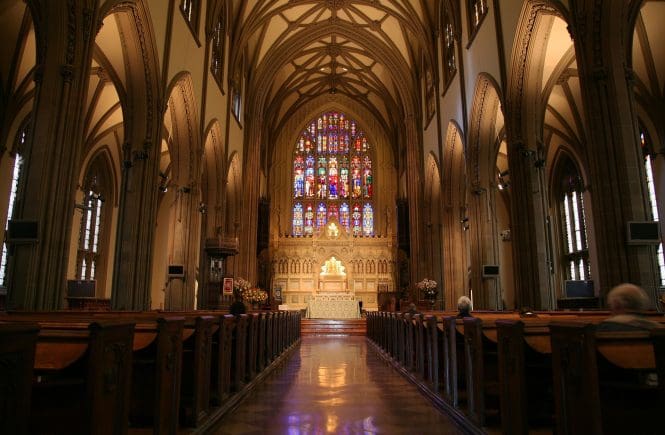A recent study by the Episcopal Church identified nine patterns of systemic racism within the church, including tokenism and difficulty navigating power structures within the church. And recent multiple Title IV clergy disciplinary complaints involving the Church Divinity School of the Pacific (CDSP) and Trinity Wall Street make clear that structural racism is alive and well, even at the highest levels of the church.
We are not naming the individuals who have filed the complaints in order to allow the Title IV disciplinary process to proceed anonymously if the complainants wish. But at the heart of the allegations are complaints that:
- CDSP hired a minority instructor on a pretextual basis. Specifically, when Trinity Wall Street took over CDSP, the school told incoming faculty that the school was making “all things new.”
- Yet, as COVID restrictions eased, CDSP called the minority faculty member to a meeting where the school demanded that she attend communal worship. This demand ran counter to the faculty member’s request to be excused from collective worship for the time being to focus on writing her dissertation.
- The faculty member requested that HR representatives be present. This request aligns with the church’s findings, which held that minorities often fare better when they have assistance navigating Episcopal power structures. Yet CDSP refused the request, making clear it does not even recognize its own racist power dynamics.
- CDSP terminated the faculty member when she refused the coercive request that she attend worship. So much for being a change agent.
- An investigation led by Trinity Wall Street followed. There was little to no communication or care for the complainant. Whether the issue involved Title IV or termination of a paid position, the church’s first concern should be caring for all involved. Moreover, transparency is an essential element of accountability and establishing trust. All of these were sorely lacking.
- While CDSP paid a small portion of the amount due under the faculty member’s contract, it initially tried to obtain a nondisclosure agreement (NDA). NDAs are inherently unethical unless requested by the injured party and are now illegal under Federal law in cases involving sexual misconduct. Per ndafree.org:
NDAs discriminate against the powerless and in favor of the powerful. They block truth telling, silence the wounded, require complicity from others in power and, upon exposure, accuse churches and leaders of manipulation and deception. The gospel counters NDAs.
- Not surprisingly, the former faculty member believes CDSP tokenized her — a widespread perception among minorities in the Episcopal Church, one of the whitest of all denominations.
Our Take
With many dioceses and churches providing for sabbaticals following the stress and trauma of the pandemic, why would CDSP object to time away from communal worship? As a society, we have experienced enough suffering over the past few years that it is time to double down on kindness. And in the scheme of things, this is a really minor request.
That’s all the more the case when, just a few weeks earlier, all worship was virtual at CDSP.
And if CDSP is so worried about community, it can start by showing love for its community members. That’s particularly true when dealing with minorities, many of whom face disadvantages and biases to which whites are oblivious. Doubt it? Read the church’s report on the topic.
And whatever happened to the big tent of Anglicanism? Cannot someone worship with equal enthusiasm in their own home versus a communal setting? Might the faculty member have had concerns about exposure to COVID?
Or perhaps she just wanted time away from white power structures in a church that remains overwhelmingly white and structurally racist. As Elizabeth I famously said, “I have no desire to make windows into men’s souls.” And while CDSP may not be trying to peer into the souls of its faculty, it sure has some control issues.
Anglican Watch also notes the glaring structural racism when we contrast the situation at CDSP with that of white Episco-bro Whayne Hougland, former bishop of the two Michigan dioceses. Hougland has an extramarital affair and gets rewarded with a costly golden parachute. The minority faculty member at CDSP, already struggling to make ends meet, asks for some downtime and gets canned. How can any rational actor compare the two situations and not conclude the church is spectacularly racist?
Worst of all, at the meeting at which CDSP fired the faculty member, one staff member said something profoundly ugly and telling: “We loved you.”
Good to know that love at CDSP depends on conformity with white power structures. And then the church wonders why folks just aren’t interested.
As for Trinity Wall Street and its claim to be working for equity and inclusion, we are calling BS. It’s one thing to post this Jesus-babble on the church’s website. It’s another thing to live it; in this case, Trinity is living a lie.
And for both institutions, if we ask the question, “Who is Jesus in this situation?,” it’s neither CDSP nor Trinity Wall Street. It is the victim.
Finally, neither organization should pull the classic Episcopal trick of sighing and saying, “Well, it’s water over the dam.” It is not. Sin is sin and this situation needs to be fixed, both on the individual level and on the organizational level. And that is all the more the case during this season of Lent.



Leave a Reply